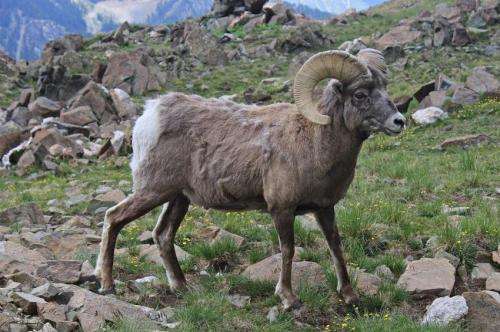This article has been reviewed according to Science X's editorial process and policies. Editors have highlighted the following attributes while ensuring the content's credibility:
fact-checked
reputable news agency
proofread
Domestic sheep will no longer graze swath of Colorado land to protect bighorns from 'pernicious' disease

Ernie Etchart's family has raised sheep in the San Juan mountains for more than 70 years, taking the herd of thousands every summer to the green, open meadows of the high country to graze.
But the Etcharts will stop using their permits to graze on more than 101,000 acres of public land—a swath about the size of the city of Denver—in a deal with a nonprofit that's aimed at protecting bighorn sheep from the deadly diseases that can be passed from their domestic relatives.
"It's a difficult decision," Etchart said. "You've been doing business in this area for many years. Every summer we had the move back up and back down from the high country. Over time, things have changed."
The deal between the Etchart family and the National Wildlife Federation is intended to keep bighorn sheep from interacting with domestic sheep, which can pass on deadly pneumonia. The disease is particularly destructive: It not only wipes out large percentages of a herd but can also be passed on to ewes born later into the herd once it's carrying the disease.
Since those ewes lack immunity, the vast majority die within a month of their birth, said Bob McCready, the wildlife conflict resolution program manager with the National Wildlife Federation.
"It's such a pernicious pathogen because it stays in that herd for many, many years—often decades," he said.
The National Wildlife Federation started brokering similar grazing agreements about two decades ago as a solution to wildlife conflict. The deals have fairly compensated ranchers and avoided years of litigation.
Combined, the grazing permits that no longer are being used add up to 1.7 million acres—a land mass approximately the size of Delaware.
The deal announced Wednesday with the Etcharts, with undisclosed financial terms, is the largest the nonprofit has ever brokered in Colorado in terms of land area.
It's a win-win solution, McCready said, "This is about finding common ground to solve a wildlife conservation problem," he said.
Bighorn sheep were on the brink of extinction in Colorado a century ago because of unregulated hunting and disease from domestic livestock. Colorado Parks and Wildlife began transplanting bighorns to Colorado in the 1940s, and the state's population has rebounded to approximately 7,000. Diseases from domestic livestock are the biggest hindrance to the rebound of the species in Colorado, Colorado Parks and Wildlife says.
The state's current bighorn population is about 10% of its historical size, according to the National Wildlife Federation. An estimated 400 bighorn sheep live in and near the allotments being retired by the Etcharts, said Terry Meyers, executive director of Rocky Mountain Bighorn Society.
The wildlife federation is not opposed to using public lands for grazing, McCready said.
"But there are situations where there are acute conflicts between livestock grazing and wildlife that have not been resolved through other means," he said. "At that point, and only at that point, do we come in and offer this option to the rancher. It's purely voluntary."
For the Etcharts, it wasn't just potential bighorn disease that prompted the family to retire the allotments. They've also seen increased human traffic through the land near Silverton and Ouray as tourism and outdoor recreation boomed in the area.
Increased backcountry use can scatter and stress the sheep, Etchart said.
"I'm sure throughout the West, public lands are experiencing an increase—these ones especially," Etchart said. "Do you fight it? Or do you do something that will let you continue your operation? That's what we looked at as a family."
The family will use some of the money from the deal to lease private land for summer grazing, he said.
"At the end of the day, we're trying to do the best that we can for all," Etchart said. "We want to create a scenario that is good for everyone."
2023 MediaNews Group, Inc. Distributed by Tribune Content Agency, LLC.

















